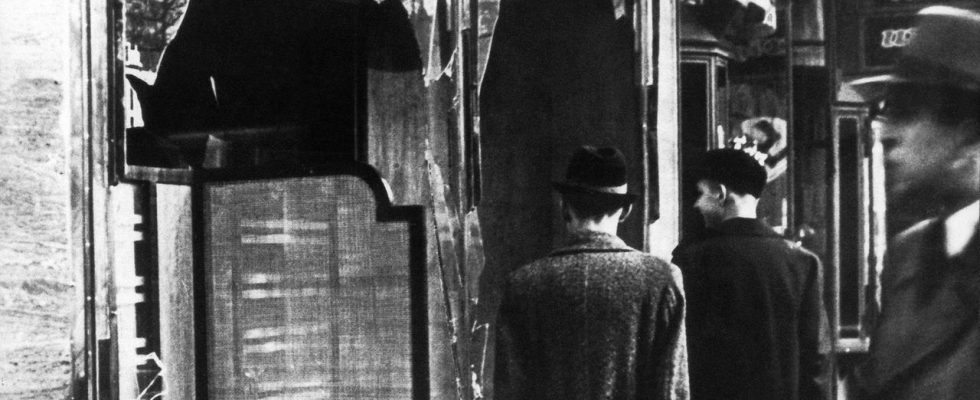interview
Anti-Semitism is always on the rise in different societies, says historian Ulrich Herbert. In the interview he explains what led to the pogrom night 85 years ago and what can be deduced for today.
tagesschau24: Today, as every year, the pogroms of 1938 are remembered. What is different this year from your perspective?
Ulrich Herbert: The events of October 7th took the understanding of Judaism and anti-Semitism to a whole new level. We experienced a massacre not seen since the Second World War. And people were killed because they were Jews. And that is reminiscent of the development 85 years ago, in 1938 in Germany.
tagesschau24: How did this happen in 1938? This night didn’t come out of nowhere.
Herbert: Anti-Semitism was already widespread in Germany before the First World War, but not as strong as in other countries, such as Russia or France at that time. The defeat of the First World War gave a very strong boost to anti-Semitism because the Jews were blamed for the Germans losing the war.
And the fact that hyperinflation arose was also attributed to the Jews. The economic crisis was also attributed to the Jews. The Jews were a kind of passe-partout for all the displeasures and unpleasantness and defeats of the Germans, for which, so it was said at the time, they wanted to take revenge. And that exploded in 1938 and significantly changed the situation in Nazi Germany.
“Ignorance of the fate of the Jews”
tagesschau24: That means there were, I’ll call it: scapegoating debates beforehand?
Herbert: Scapegoating is perhaps a bit too trivializing. The point is that in Germany, but also in other countries, the Jews were held responsible for the great upheavals of modernity, capitalism as well as communism. So everything that was new to people, that fell upon them, was not understood and was attributed to a secret power that was responsible for all of it. This came to a head again with the global economic crisis.
I believe that a large proportion of Germans were not that interested in the issue, but simply accepted it because it was a small, often despised minority that was not really taken care of very much. This is often a little different in today’s picture. You get the feeling that the Germans didn’t care about anything else. On the contrary: it was more the case that ignorance about the fate of the Jews was relevant here.
To person
Ulrich Herbert is head of the contemporary history research group at the University of Freiburg. His focus areas include German and European history of the 20th century as well as Holocaust research.
“The German population didn’t care much”
tagesschau24: If you now draw a comparison to today – we are under great pressure to transform. Do you see any parallels?
Herbert: I think that’s always true. Anti-Semitism is the biggest conspiracy theory of modern times, resorted to again and again when things don’t go the way people expect or hope. The current situation is of course characterized by the Middle East conflict, which has basically been a hot war, sometimes a cold war since the end of the Second World War and has had a strong influence on the situation. The transformations are not easy. In 1938, as today, it was of course about dealing with Jews as such. They are attacked because they are Jews.
But the role of the State of Israel has a different meaning – also for the Jews themselves. Because in 1938 the Jews were alone against the Nazis. The German population didn’t care much. The pogrom was carried out by the SA, very much by the HJ, i.e. the Hitler Youth, rather by party people. There was little positive reaction from the population. It’s quite remarkable that it wasn’t that relevant, let’s say radical, on the part of the population.
Solidarity is necessary in everyday life
tagesschau24: The contemporary witnesses die. From your perspective, what can we as a society, but also as the media, do or not do to make a never-again possible?
Herbert: The first is certainly not the easiest, preventing right-wing radical and fascist regimes from existing. This is the basic consequence of National Socialism as a whole and of the persecution of the Jews in particular. The second thing is that you are well advised to pay particular attention and attention to the minorities in your own country. Above all with those who are excluded and viewed as inferior or as enemies. This is where the radicalizing tendencies begin, so to speak. And here you have to be careful that society looks particularly carefully at those who are in the shadows and also exercises solidarity here.
It is easy to practice solidarity when the entire state, from top to bottom, is committed to it. This is much more difficult in situations in which the public’s behavior is not so clear. This is another consequence of this approach.
The interview was conducted by Mikhail Paweletz for tagesschau24. It has been shortened and edited for the written version.

